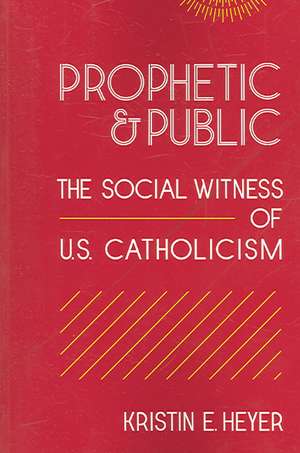Prophetic and Public: Moral Traditions series
Autor Kristin E. Heyeren Limba Engleză Paperback – 2 iun 2006
Din seria Moral Traditions series
-
 Preț: 242.06 lei
Preț: 242.06 lei -
 Preț: 296.31 lei
Preț: 296.31 lei -
 Preț: 370.80 lei
Preț: 370.80 lei -
 Preț: 332.05 lei
Preț: 332.05 lei -
 Preț: 275.15 lei
Preț: 275.15 lei -
 Preț: 236.86 lei
Preț: 236.86 lei -
 Preț: 331.82 lei
Preț: 331.82 lei -
 Preț: 324.81 lei
Preț: 324.81 lei -
 Preț: 198.44 lei
Preț: 198.44 lei -
 Preț: 226.33 lei
Preț: 226.33 lei -
 Preț: 257.51 lei
Preț: 257.51 lei -
 Preț: 345.18 lei
Preț: 345.18 lei -
 Preț: 325.55 lei
Preț: 325.55 lei -
 Preț: 270.55 lei
Preț: 270.55 lei -
 Preț: 300.24 lei
Preț: 300.24 lei -
 Preț: 476.09 lei
Preț: 476.09 lei -
 Preț: 262.19 lei
Preț: 262.19 lei - 27%
 Preț: 986.62 lei
Preț: 986.62 lei -
 Preț: 462.04 lei
Preț: 462.04 lei -
 Preț: 175.46 lei
Preț: 175.46 lei -
 Preț: 455.29 lei
Preț: 455.29 lei -
 Preț: 291.90 lei
Preț: 291.90 lei - 23%
 Preț: 621.24 lei
Preț: 621.24 lei -
 Preț: 360.27 lei
Preț: 360.27 lei - 23%
 Preț: 590.29 lei
Preț: 590.29 lei -
 Preț: 263.54 lei
Preț: 263.54 lei -
 Preț: 277.16 lei
Preț: 277.16 lei -
 Preț: 460.89 lei
Preț: 460.89 lei -
 Preț: 461.11 lei
Preț: 461.11 lei - 23%
 Preț: 616.63 lei
Preț: 616.63 lei - 23%
 Preț: 654.58 lei
Preț: 654.58 lei -
 Preț: 264.61 lei
Preț: 264.61 lei -
 Preț: 470.15 lei
Preț: 470.15 lei -
 Preț: 470.91 lei
Preț: 470.91 lei - 27%
 Preț: 988.03 lei
Preț: 988.03 lei -
 Preț: 461.11 lei
Preț: 461.11 lei -
 Preț: 457.63 lei
Preț: 457.63 lei - 27%
 Preț: 727.08 lei
Preț: 727.08 lei -
 Preț: 468.78 lei
Preț: 468.78 lei - 5%
 Preț: 249.08 lei
Preț: 249.08 lei -
 Preț: 460.89 lei
Preț: 460.89 lei -
 Preț: 289.01 lei
Preț: 289.01 lei -
 Preț: 460.13 lei
Preț: 460.13 lei -
 Preț: 461.87 lei
Preț: 461.87 lei - 5%
 Preț: 444.99 lei
Preț: 444.99 lei
Preț: 464.55 lei
Nou
Puncte Express: 697
Preț estimativ în valută:
88.89€ • 92.100$ • 73.84£
88.89€ • 92.100$ • 73.84£
Carte tipărită la comandă
Livrare economică 02-16 aprilie
Preluare comenzi: 021 569.72.76
Specificații
ISBN-13: 9781589010826
ISBN-10: 1589010825
Pagini: 228
Dimensiuni: 153 x 230 x 16 mm
Greutate: 0.4 kg
Editura: Georgetown University Press
Seria Moral Traditions series
ISBN-10: 1589010825
Pagini: 228
Dimensiuni: 153 x 230 x 16 mm
Greutate: 0.4 kg
Editura: Georgetown University Press
Seria Moral Traditions series
Descriere
The United States was founded on a commitment to religious tolerance. Inherent in this political reality is the question, "What is the appropriate relationship between religious beliefs and public life?" This is not a new question, but in contemporary US politics it has become a particularly insistent one. This book offers new and nuanced answers.
